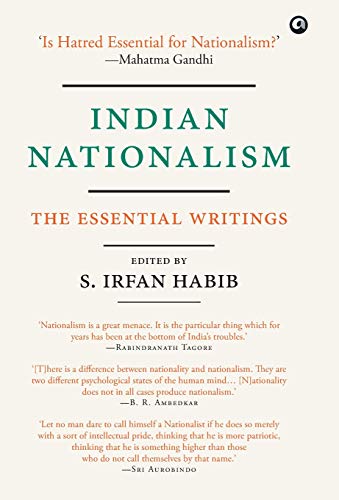Items related to Indian Nationalism: The Essential Writings

Synopsis
How do we define nationalism? Who is a good nationalist? Do you become anti-national if you criticize the government? These are questions that overwhelm most debates today, but these discussions are not new. And while the loudest voices would have us believe that Indian nationalism is (and has always been) a narrow, parochial, xenophobic one, our finest political leaders, thinkers, scientists and writers have been debating the concept since the early nineteenth century and come to a different conclusion. Nationalism as we understand it today first came into being more than a hundred years ago. Studied by historians, political scientists and sociologists for its role in world history, it remains one of the strongest driving forces in politics and also the most malleable one. A double-edged sword, it can be a binding force or a deeply divisive instrument used to cause strife around political, cultural, linguistic or, more importantly, religious identities. In this anthology, historian S. Irfan Habib traces the growth and development of nationalism in India from the late nineteenth century through its various stages: liberal, religion-centric, revolutionary, cosmopolitan, syncretic, eclectic, right liberal...The views of our most important thinkers and leaders Mahatma Gandhi, Jawaharlal Nehru, C. Rajajgopalachari, Bhagat Singh, Bal Gangadhar Tilak, Sarojini Naidu, B. R. Ambedkar, Rabindranath Tagore, M. N. Roy, Maulana Azad, Jayaprakash Narayan and others remind us what nationalism should mean and the kind of inclusive, free and humanistic nation that we should continue to build. KEY SELLING POINTS A very timely book as the debate of what is nationalism and who is an anti-national is raging in the country. A comprehensive and nuanced selection which explores diverse views on nationalism. Includes selections from some of the country s most famous leaders and thinkers, including Mahatma Gandhi, Jawaharlal Nehru, C. Rajajgopalachari, Bhagat Singh, Bal Gangadhar Tilak, Sarojini Naidu, B. R. Ambedkar, Rabindranath Tagore, M. N. Roy, Maulana Azad, Jayaprakash Narayan and others.
"synopsis" may belong to another edition of this title.
About the Author
S. IRFAN HABIB is a widely published historian of science and modern political history. Until recently he held the Maulana Azad Chair at the National University of Educational Planning and Administration, New Delhi.
"About this title" may belong to another edition of this title.
- PublisherALEPH BOOK COMPANY PRIVATE LIMITED
- Publication date2018
- ISBN 10 9386021056
- ISBN 13 9789386021052
- BindingHardcover
- LanguageEnglish
- Number of pages296
- Rating
Shipping:
US$ 10.16
From United Kingdom to U.S.A.
Search results for Indian Nationalism: The Essential Writings
Indian Nationalism: The Essential Writings
Seller: Books Puddle, New York, NY, U.S.A.
Condition: New. Seller Inventory # 26375612649
Quantity: 4 available
Indian Nationalism: The Essential Writings
Print on DemandSeller: Majestic Books, Hounslow, United Kingdom
Condition: New. Print on Demand. Seller Inventory # 370465590
Quantity: 4 available
Indian Nationalism: The Essential Writings
Seller: WeBuyBooks, Rossendale, LANCS, United Kingdom
Condition: Very Good. Most items will be dispatched the same or the next working day. A copy that has been read, but is in excellent condition. Pages are intact and not marred by notes or highlighting. The spine remains undamaged. Seller Inventory # wbs8020346048
Quantity: 1 available
Indian Nationalism: The Essential Writings
Seller: Book Deals, Tucson, AZ, U.S.A.
Condition: Fine. Like New condition. Great condition, but not exactly fully crisp. The book may have been opened and read, but there are no defects to the book, jacket or pages. 0.9. Seller Inventory # 353-9386021056-lkn
Quantity: 1 available
Indian Nationalism
Seller: Books in my Basket, New Delhi, India
N.A. Condition: New. ISBN:9789386021052 N.A. Seller Inventory # 2369561
Quantity: 2 available
Indian Nationalism: The Essential Writings
Print on DemandSeller: Biblios, Frankfurt am main, HESSE, Germany
Condition: New. PRINT ON DEMAND. Seller Inventory # 18375612643
Quantity: 4 available
Indian Nationalism: The Essential Writings
Seller: Vedams eBooks (P) Ltd, New Delhi, India
Hardcover. Condition: New. 1st Edition. How do we define nationalism? Who is a good nationalist? Do you become anti-national if you criticize the government? These are questions that overwhelm most debates today, but these discussions are not new. And while the loudest voices would have us believe that Indian nationalism is (and has always been) a narrow, parochial, xenophobic one, our finest political leaders, thinkers, scientists and writers have been debating the concept since the early nineteenth century and come to a different conclusion. Nationalism as we understand it today first came into being more than a hundred years ago. Studied by historians, political scientists and sociologists for its role in world history, it remains one of the strongest driving forces in politics and also the most malleable one. A double-edged sword, it can be a binding force or a deeply divisive instrument used to cause strife around political, cultural, linguistic or, more importantly, religious identities. In this anthology, historian S. Irfan Habib traces the growth and development of nationalism in India from the late nineteenth century through its various stages: liberal, religion-centric, revolutionary, cosmopolitan, syncretic, eclectic, right liberalThe views of our most important thinkers and leaders-Mahatma Gandhi, Jawaharlal Nehru, C. Rajajgopalachari, Bhagat Singh, Bal Gangadhar Tilak, Sarojini Naidu, B. R. Ambedkar, Rabindranath Tagore, M. N. Roy, Maulana Azad, Jayaprakash Narayan and others-remind us what nationalism should mean and the kind of inclusive, free and humanistic nation that we should continue to build. Seller Inventory # 123588
Quantity: 1 available
Indian Nationalism: The Essential Writings
Seller: Lucky's Textbooks, Dallas, TX, U.S.A.
Condition: New. Seller Inventory # ABLIING23Apr0412070037448
Quantity: Over 20 available
INDIAN NATIONALISM
Print on DemandSeller: PBShop.store US, Wood Dale, IL, U.S.A.
HRD. Condition: New. New Book. Shipped from UK. THIS BOOK IS PRINTED ON DEMAND. Established seller since 2000. Seller Inventory # L1-9789386021052
Quantity: Over 20 available
INDIAN NATIONALISM
Print on DemandSeller: PBShop.store UK, Fairford, GLOS, United Kingdom
HRD. Condition: New. New Book. Delivered from our UK warehouse in 4 to 14 business days. THIS BOOK IS PRINTED ON DEMAND. Established seller since 2000. Seller Inventory # L1-9789386021052
Quantity: Over 20 available
